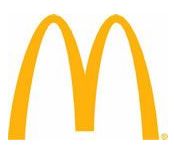What is a Trademark?
Use in Commerce
A trademark arises by use in commerce and signifies the rights that a person or entity acquires to the use of a word, phrase, symbol or other mark in a particular field. Branding is built around trademarks by using a mark "in commerce."
Only through the actual use of a mark can one obtain trademark status and, therefore, be able to protect oneself from other parties' use of the mark in a similar field. While registration may be obtained at both state and federal level, proof of actual use is generally required before a trademark owner can prohibit others from using a similar mark.

Examples of Trademarks
Trademarks can take a variety of forms in the business world. Everything from fast food to computers to cars is swamped with examples of trademarks.
McDonalds is one of the most well known brands in the world. Anytime a person sees the golden arches, he or she immediately associates those with all things McDonalds - Big Macs, Happy Meals, McFlurries, etc.
Just looking at McDonalds alone, you can see that there are a number of names and marks identified with a variety of products. For example, McDonalds could certainly prevent other restaurants from using the name "Big Mac" to describe any food item on their menu. Likewise, Burger King could prevent other restaurants from using the name "Whopper" to describe their burgers.
These rights, as noted above, arise by McDonalds' and Burger King's continued use of these names to describe their products. Because they were the first fast food joints to name their respective products with these unique marks, others are prohibited from infringing on these marks and piggybacking off of McDonalds and Burger King's brand recognition.
Think for a moment about other industries, computers, Internet websites, automobiles . . . all of these have brands that are just as recognizable to you as McDonalds and Burger King. Likely, you can also think of several subsets of marks under the main brand name that would also be identifiable as trademarks exclusive to that company (e.g., Dell's Inspiron, Ford's Mustang, etc.)
Strength of Trademarks
The United States Patent and Trademark Office and United States courts look at the strength of trademarks to determine whether they are entitled to protection under US law. There are four basic categories which trademarks will fall into.
Arbitrary or Fanciful Marks
These types of trademarks truly build a brand from a very unique naming scheme. Using the name Apple for a computer is a completely arbitrary branding because nothing about computers in general would suggest or describe the mark "Apple" to be associated with them. Likewise, Kodak is a fanciful mark that had never been used to describe cameras, film or other photographic accessories. These types of marks are almost always guaranteed protection under US trademark law if there are no pre-existing uses for such names in the given industry.
Suggestive Marks
Suggestive marks do just what the name implies, the suggest the nature of the product or service represented by the mark. They don't go so far as to describe what the product is or does, rather they indicate something about the product or service that seems to logically follow from the name of the mark. One example is Blu-ray for high definition video discs, which are read by a blue laser developed by Sony. Suggestive marks are generally entitled to trademark protection because the mark is unique enough to used exclusively and not so general to preclude an ordinary use of such a word.
Descriptive Marks
Again, the name implies that a descriptive mark simply describes the nature of a product or service. Generally, descriptive marks are not entitled to protection because use of a descriptive mark would preclude other reasonable uses to describe the product or service. When are mark is "merely descriptive" as determined by the USPTO or US courts, the would-be trademark holder is not entitled to exclusive use of the mark. Descriptive marks like NOZZLE-LOK for "a portable plastic gasoline container" have been refused because it merely described a feature of the gasoline can.
Descriptive marks may be registered on the Supplemental Register with the USPTO and, in the event the marks acquire secondary meaning, additional rights and protection may be obtained. An example of a descriptive mark that is entitled to trademark protection is Ben & Jerry's Ice Cream. Typically, first names are impermissible to bar others from the use of a mark; however, the names Ben & Jerry have obtained sufficient secondary meaning that they are no longer "merely descriptive" in the eyes of the law.
Generic Marks
US trademark law offers no protection to marks that are generic in form or substance. "Salt" cannot be used as a trademark for salt. It is a generic name of sodium chloride and therefore unprotectable as a trademark for the same. Additionally, some trademarks that were once entitled to protection may become genericized by common usage to describe a particular activity or type of product. Google has become particularly active in its efforts to prevent people from using its trademark as a verb. Google reminds us that googling a term on the web is not proper; however, if you would like to search for a term on the Google search engine or another web search servie, then you are entitled to do so. The same applies to photoshopping an image. Continued use of an otherwise proper trademark as a generic verb for an activity can result in the mark being genericized, something no trademark owner wants and must, when the brand becomes a popular term, maintain a constant vigil to protect against.








